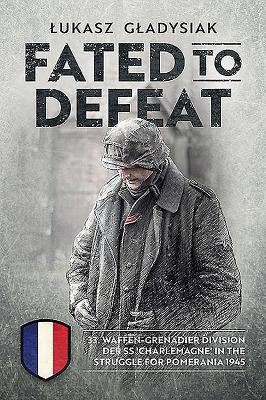
- Retrait gratuit dans votre magasin Club
- 7.000.000 titres dans notre catalogue
- Payer en toute sécurité
- Toujours un magasin près de chez vous
- Retrait gratuit dans votre magasin Club
- 7.000.0000 titres dans notre catalogue
- Payer en toute sécurité
- Toujours un magasin près de chez vous
Fated to Defeat
33. Waffen-Grenadier Division Der SS 'Charlemagne' in the Struggle for Pomerania 1945
Lukasz Gladysiak
Livre broché | Anglais
27,95 €
+ 55 points
Description
33. Waffen-Grenadier Division der SS was one of a number of divisions in the Third Reich's armed forces composed of foreign soldiers. The majority that formed this unit were French: volunteers or men who, because of collaboration, had been forced to help the German's on the eve of the Allied invasion in Western Europe. During February-March 1945 the French division took part in the struggle for Pomerania, facing overwhelming Soviet and Polish Forces. The unit fought in a constant retreat and met its fate during the few days of battle in Bialogard (former Belgard an der Persante) and Karlino (Koerlin) region. From that point, after the Division's reorganisation from the German to the French pattern, the retreat transformed into a chaotic escape, which for many ended tragically in Polish or Soviet captivity, or in mass graves which are still waiting to be discovered. Only a handful of the 4,500 Frenchmen who started the battle near Czarne (Hammerstein) and Czluchów (Schlochau) managed to survive and after a few weeks reached the new meeting point in Neustrelitz, Germany. After that, some of them prepared for struggle for Berlin and went to battle once more in April 1945.
Lukasz Gladysiak's book is the first attempt by a Polish author to accurately recreate these episodes of the last stages of 33. Waffen-Grenadier Division der SS's history. Collecting historical sources from all over Europe, including German Army Group Vistula's documents, and memories of veterans of both sides of the frontline largely unpublished so far, the author takes us to the fields, towns and villages of Pomerania during the tragic days of the beginning of 1945, and follows the battle through the towns of Czarne (Hammerstein)-Czluchów (Schlochau), Szczecinek (Neustettin), Bialogard (Belgardan der Persante), Karlino (Koerlin) iKolobrzeg (Kolberg). While the chronological description of the combat forms the backbone of this book, the individual soldiers' stories, including biographies of key figures, as well as a number of previously unsolved mysteries are also covered, such as the fate of General Edgar Puaud. This is the first book that refers extensively to the French SS-men's battles in Pomerania in the last stages of the Third Reich.
Lukasz Gladysiak's book is the first attempt by a Polish author to accurately recreate these episodes of the last stages of 33. Waffen-Grenadier Division der SS's history. Collecting historical sources from all over Europe, including German Army Group Vistula's documents, and memories of veterans of both sides of the frontline largely unpublished so far, the author takes us to the fields, towns and villages of Pomerania during the tragic days of the beginning of 1945, and follows the battle through the towns of Czarne (Hammerstein)-Czluchów (Schlochau), Szczecinek (Neustettin), Bialogard (Belgardan der Persante), Karlino (Koerlin) iKolobrzeg (Kolberg). While the chronological description of the combat forms the backbone of this book, the individual soldiers' stories, including biographies of key figures, as well as a number of previously unsolved mysteries are also covered, such as the fate of General Edgar Puaud. This is the first book that refers extensively to the French SS-men's battles in Pomerania in the last stages of the Third Reich.
Spécifications
Parties prenantes
- Auteur(s) :
- Editeur:
Contenu
- Nombre de pages :
- 158
- Langue:
- Anglais
Caractéristiques
- EAN:
- 9781912866175
- Date de parution :
- 17-02-21
- Format:
- Livre broché
- Format numérique:
- Trade paperback (VS)
- Dimensions :
- 231 mm x 147 mm
- Poids :
- 317 g

Les avis
Nous publions uniquement les avis qui respectent les conditions requises. Consultez nos conditions pour les avis.






